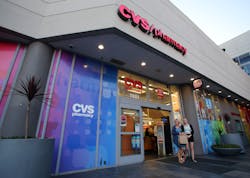CVS Health announced this weekend that it has agreed to acquire Aetna in a $69 billion dollar merger that is the largest ever in the health insurance industry.
On Sunday, Dec. 3rd, a press release from Woonsocket, R.I.-based CVS Health noted, “Under the terms of the merger agreement, which has been unanimously approved today by the boards of directors of each company, Aetna shareholders will receive $145.00 per share in cash and 0.8378 CVS Health shares for each Aetna share. The transaction values Aetna at approximately $207 per share or approximately $69 billion. Including the assumption of Aetna's debt, the total value of the transaction is $77 billion.”
According to CVS Health officials, “This transaction fills an unmet need in the current healthcare system and presents a unique opportunity to redefine access to high-quality care in lower cost, local settings whether in the community, at home, or through digital tools.”
What’s more, according to a report in the Chicago Tribune, the deal “would create an industry giant with over $240 billion in annual sales with a hand in insurance, prescription drug plan administration, retail pharmacies and corner clinics. The companies said the combination will save $750 million in costs and bring consumers better, more efficient healthcare.”
The news of this deal comes almost a full year after a federal judge blocked a merger that would have resulted in the Hartford, Conn.-based Aetna acquiring Louisville, Ky.-based insurer Humana, which at the time was the largest acquisition of its type in the history of health insurance in the U.S., reported at $37 billion. “The transaction would violate antitrust laws by reducing competition among insurers,” U.S. District Judge John D. Bates in Washington said at the time. Similarly, a proposed combination of two other health insurers, Anthem and Cigna, was also shot down this year.
Although this deal does not involve two health insurance companies like the other ones that got rejected, it is possible that antitrust regulators could disapprove this one as well, according to a CNN Money report. But if it were to get approved, it would go down as the largest health insurance deal in history, far exceeding Express Scripts' $29 billion acquisition of Medco in 2012, according to the CNN report.
When rumors ramped up earlier this fall that the deal was being seriously discussed by the two organizations, one industry observer, Larry Briski, a director in West Monroe Partners' Healthcare & Life Sciences practice, pointed out that a core obstacle in care management is access to full pharmacy information and having the ability to influence taking drugs on time. Briski said in an emailed statement at the time, “A CVS-Aetna merger will have the ability to impact drug compliance while being integrated into the care team in an unprecedented way. While people are picking up prescriptions, we can tell them at the point of retail that they need to get a check-up or have a specific test completed. Having a reliable place to interact with the member face-to-face is a missing component to the successful engagement of members today, from a health payer’s perspective. Additionally, a combined CVS-Aetna data will allow them to drive member toward the most effective, cheapest drugs available and gain cost efficiencies.”
To this end, officials from the organizations said that with this merger, “Consumers will benefit from a uniquely integrated, community-based healthcare experience. The combined company will also be able to better understand patients' health goals, guide them through the healthcare system, and help them achieve their best health.”
They added that there will expanded opportunities to bring healthcare services to consumers every day. CVS Pharmacy locations will include space for wellness, clinical and pharmacy services, vision, hearing, nutrition, beauty, and medical equipment, in addition to its other products and services. And, an entirely new health services offering available in many locations will function as a community-based health hub dedicated to connecting the pathways needed to improve health and answering patients' questions about their health conditions, as well as prescription drugs and health coverage, according to CVS Health senior officials.
Currently, there are more than 9,700 CVS Pharmacy locations and 1,100 MinuteClinic walk-in clinics as well as further extensions into the community through Omnicare's senior pharmacy solutions, Coram's infusion services, and the more than 4,000 CVS Health nursing professionals providing in-clinic and home-based care across the nation. Aetna, meanwhile, serves an estimated 44.6 million members.
Health IT Considerations
One way in which the combined entity plans to more broadly leverage data and analytics would be by helping patients avoid unnecessary hospital readmissions. As officials pointed out, readmission rates can be cut in half if patients have a complete review of their medications after discharge from the hospital to help them manage their care at home. In addition, home devices to monitor activity levels, pulse, and respiratory rates can be used to prevent readmissions. What’s more, selected high-risk patients discharged from the hospital, or their caregivers, will be able to stop at a health hub location to access services such as medication evaluations, home monitoring and use of durable medical equipment, as needed.
In commentary provided to Healthcare Informatics today, Will Hinde, managing director in the healthcare practice at West Monroe Partners, noted a few core challenges that will be presented if the merger gets held up. “Each organization faces its own independent challenges in technology debt and integration. Also, the disparate systems used by CVS and Aetna are rarely built to work together through interoperable connectivity. Integration of systems of this scale and complexity will be a massive undertaking. However, considering that this deal is a dedicated acquisition, there will be more focus on these efforts and it should facilitate more open cooperation and collaboration between entities. In the long run, CVS's effort will be worth the time, cost, and effort—otherwise they would be passing over tremendous value and the ability to differentiate from their competition.”
Brad Haller, M&A practice director at West Monroe Partners, chimed in as well on the data integration challenge, stating, “To create the right vision of a combined CVS-Aetna, there will have to be a level of technology integration and data sharing that is unprecedented, and extremely uncommon in organizations of this size. Through our experience across health plans, pharmacy benefit managers, and clinics, the core systems that store data are disorganized, on legacy architecture, and pull from disparate databases. The cost to achieve the desired state of a one-stop shop for consumers would cost hundreds of millions and take 18 to 24 months, if not longer."
In the announcement, CVS Health president and CEO Larry J. Merlo said in a statement, "With the analytics of Aetna and CVS Health's human touch, we will create a healthcare platform built around individuals. We look forward to working with the talented people at Aetna to position the combined company as America's front door to quality healthcare, integrating more closely the work of doctors, pharmacists, other healthcare professionals and health benefits companies to create a platform that is easier to use and less expensive for consumers."
Meanwhile, Mark T. Bertolini, Aetna chairman and CEO, added, “This is the next step in our journey, positioning the combined company to dramatically further empower consumers. Together with CVS Health, we will better understand our members' health goals, guide them through the health care system and help them achieve their best health.”
Upon the closing of the transaction, officials said that three of Aetna's directors, including Bertolini, will be added to the CVS Health Board of Directors. In addition, members of the Aetna management team will play significant roles in the newly combined company. Aetna will operate as a stand-alone business unit within the CVS Health enterprise and will be led by members of their current management team.


